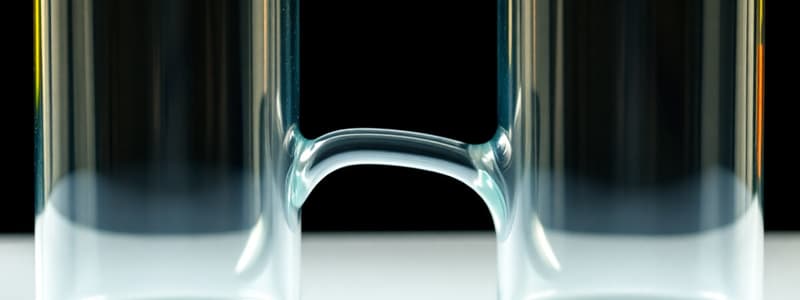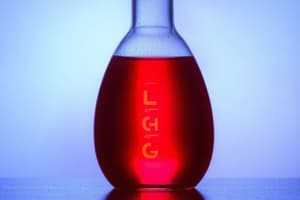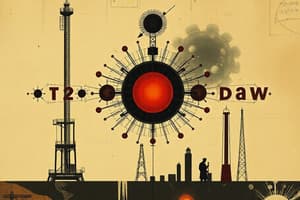Podcast
Questions and Answers
How does increasing pressure affect the volume of a gas inside a balloon?
How does increasing pressure affect the volume of a gas inside a balloon?
- The volume increases.
- The volume fluctuates randomly.
- The volume stays constant.
- The volume decreases. (correct)
What will happen to the temperature of a gas if the volume decreases at constant pressure?
What will happen to the temperature of a gas if the volume decreases at constant pressure?
- The temperature will fluctuate randomly.
- The temperature will remain constant.
- The temperature will increase.
- The temperature will decrease. (correct)
If we double the pressure on a 1.0 L sample of gas initially at 850 mm Hg while keeping the temperature constant, what is the new volume?
If we double the pressure on a 1.0 L sample of gas initially at 850 mm Hg while keeping the temperature constant, what is the new volume?
- 0.5 L (correct)
- 4.0 L
- 2.0 L
- 1.0 L
Why does a hot air balloon rise when the air inside it is heated?
Why does a hot air balloon rise when the air inside it is heated?
Which of the following best represents Charles' Law in action?
Which of the following best represents Charles' Law in action?
A weather balloon has a volume of 100 L at 27°C. At a higher altitude the temperature is -3°C. If the pressure is constant, what happens to the volume of the Balloon?
A weather balloon has a volume of 100 L at 27°C. At a higher altitude the temperature is -3°C. If the pressure is constant, what happens to the volume of the Balloon?
What property of gases makes them more compressible compared to liquids and solids?
What property of gases makes them more compressible compared to liquids and solids?
Consider a closed container of gas at a constant volume. According to the kinetic molecular theory, increasing the temperature of the gas will:
Consider a closed container of gas at a constant volume. According to the kinetic molecular theory, increasing the temperature of the gas will:
According to the kinetic molecular theory, which of the following statements is NOT true about gas particles?
According to the kinetic molecular theory, which of the following statements is NOT true about gas particles?
Which of the following statements best describes an 'ideal gas' as it relates to the kinetic-molecular theory?
Which of the following statements best describes an 'ideal gas' as it relates to the kinetic-molecular theory?
If the Kelvin temperature of a gas doubles, what happens to the average speed of the gas particles?
If the Kelvin temperature of a gas doubles, what happens to the average speed of the gas particles?
According to Boyle's Law, if the volume of a gas is increased at constant temperature, what happens to the pressure?
According to Boyle's Law, if the volume of a gas is increased at constant temperature, what happens to the pressure?
Why does tire pressure increase during the summer?
Why does tire pressure increase during the summer?
If the temperature of an enclosed gas decreases, while the pressure is held constant, its volume:
If the temperature of an enclosed gas decreases, while the pressure is held constant, its volume:
How can the negligible mass of gas particles be demonstrated?
How can the negligible mass of gas particles be demonstrated?
Which of the following is NOT an assumption of the kinetic molecular theory regarding the motion of gas particles?
Which of the following is NOT an assumption of the kinetic molecular theory regarding the motion of gas particles?
Which of the following statements expresses an assumption of the kinetic molecular theory?
Which of the following statements expresses an assumption of the kinetic molecular theory?
A gas occupies a volume of 4.0 L at a pressure of 1.0 atm. If the volume of the gas halves to 2.0 L, what is its original pressure if the temperature remains unchanged?
A gas occupies a volume of 4.0 L at a pressure of 1.0 atm. If the volume of the gas halves to 2.0 L, what is its original pressure if the temperature remains unchanged?
What happens to the volume of a fixed amount of gas at a constant pressure when the absolute temperature (in Kelvin) is doubled?
What happens to the volume of a fixed amount of gas at a constant pressure when the absolute temperature (in Kelvin) is doubled?
In a container that is inflated with air, assuming that air can compress, what statement best explains what is occuring?
In a container that is inflated with air, assuming that air can compress, what statement best explains what is occuring?
Flashcards
Kinetic Molecular Theory
Kinetic Molecular Theory
The theory that explains gas behavior based on particle motion and distances.
Boyle's Law
Boyle's Law
The volume of a fixed gas quantity at constant temperature is inversely proportional to pressure.
Charles' Law
Charles' Law
The volume of a gas is directly proportional to its absolute temperature at constant pressure.
Ideal Gases
Ideal Gases
Signup and view all the flashcards
Pressure
Pressure
Signup and view all the flashcards
Temperature
Temperature
Signup and view all the flashcards
Study Notes
- The module is about the behavior of gases.
- The module aims to explain the relationship between the properties of gases using kinetic molecular theory.
Kinetic Molecular Theory
- States, that the volume of individual gas particles is negligible compared to the gas's overall volume.
- Gas particles are in constant, random motion, moving in straight lines until colliding with another particle or a wall.
- Gas particles have no attractive forces between each other or the container walls.
- When particles collide, kinetic energy is conserved, with no energy gained or lost.
- Absolute temperature affects the average kinetic energy of gas particles; higher temperature means higher average kinetic energy.
- At absolute zero, particle motion ceases.
- These assumptions are most accurate for ideal gases but can be applied to real gases too.
Boyle's Law
- It states that the volume of any gas at a constant temperature is inversely proportional to its pressure.
- When two measurements are inversely proportional, one gets smaller as the other gets larger.
- Expressed mathematically as: P * V = k, or P1 * V1 = P2 * V2
- Pressure relies on how often particles collide; higher frequency in smaller volumes, leading to greater pressure.
Charles' Law
- The law states the volume of a fixed amount of gas at constant pressure is directly proportional to its absolute temperature.
- When two measurements are directly proportional, one increases as the other also increases.
- Expressed mathematically as: V / T = k, or V1 / T1 = V2 / T2
- 0 K (absolute zero) is equal to -273.15 degrees Celsius.
Studying That Suits You
Use AI to generate personalized quizzes and flashcards to suit your learning preferences.




